
Qissa Khwani Bazaar: The Storytellers' Market of Peshawar
Welcome to Qissa Khwani Bazaar, the heart and soul of Peshawar, Pakistan. Known as the 'Bazaar of Storytellers,' this historic marketplace is a vibrant tapestry of culture, history, and traditions. It is a place where stories come to life through the bustling streets, aromatic food stalls, and centuries-old architecture. As you stroll through the narrow lanes, you'll be captivated by the rich history that dates back to the days of the Silk Road. The bazaar is lined with traditional shops selling everything from exotic spices and handmade carpets to intricate jewelry and antiques. The air is filled with the tantalizing aroma of kebabs, biryanis, and other local delicacies, making it a paradise for food lovers. Qissa Khwani Bazaar is not just a market; it is a living museum. The historic buildings, with their intricate woodwork and vibrant facades, tell stories of the past. You can also visit the various tea houses, where local storytellers once gathered to share tales of heroism, romance, and adventure. Today, these tea houses serve as cozy spots where you can enjoy a cup of traditional green tea while soaking in the ambiance of this enchanting marketplace.
Local tips in Qissa Khwani Bazaar
- Visit early in the morning to avoid the crowds and experience the market at its liveliest.
- Don't miss trying the famous Peshawari kebabs from the street vendors.
- Wear comfortable shoes as you'll be walking through narrow and sometimes uneven lanes.
- Take time to chat with local shopkeepers; they often have fascinating stories and can recommend the best places to visit.
- Keep some cash handy as many small vendors do not accept credit cards.
Qissa Khwani Bazaar: The Storytellers' Market of Peshawar
Welcome to Qissa Khwani Bazaar, the heart and soul of Peshawar, Pakistan. Known as the 'Bazaar of Storytellers,' this historic marketplace is a vibrant tapestry of culture, history, and traditions. It is a place where stories come to life through the bustling streets, aromatic food stalls, and centuries-old architecture. As you stroll through the narrow lanes, you'll be captivated by the rich history that dates back to the days of the Silk Road. The bazaar is lined with traditional shops selling everything from exotic spices and handmade carpets to intricate jewelry and antiques. The air is filled with the tantalizing aroma of kebabs, biryanis, and other local delicacies, making it a paradise for food lovers. Qissa Khwani Bazaar is not just a market; it is a living museum. The historic buildings, with their intricate woodwork and vibrant facades, tell stories of the past. You can also visit the various tea houses, where local storytellers once gathered to share tales of heroism, romance, and adventure. Today, these tea houses serve as cozy spots where you can enjoy a cup of traditional green tea while soaking in the ambiance of this enchanting marketplace.
Iconic landmarks you can’t miss
Kohati Gate
Discover the historical Kohati Gate in Peshawar, a gateway to ancient culture and vibrant local life.
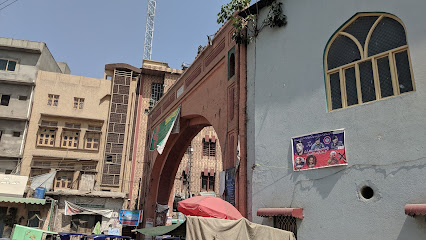
Shahi Bagh
Discover the beauty and history of Shahi Bagh, Peshawar's lush park, where nature meets culture in a picturesque setting.
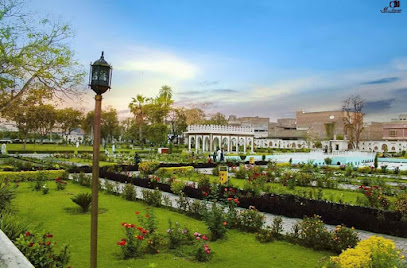
Sir Cunningham Clock Tower
Discover the beauty of Sir Cunningham Clock Tower, a historical landmark in Peshawar, where rich history meets vibrant culture.
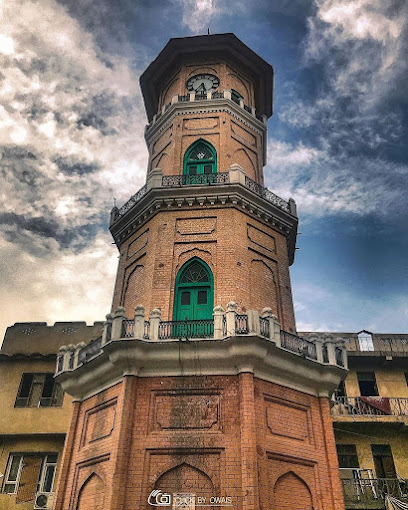
Kabuli Gate Qissa Khwani Bazar
Explore Kabuli Gate Qissa Khwani Bazar, a historical landmark in Peshawar, where vibrant culture and delicious cuisine blend in an unforgettable experience.
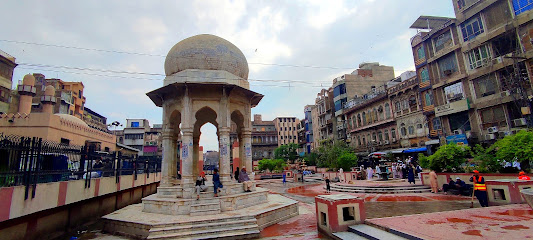
Peshawar Museum
Explore Peshawar Museum to uncover the fascinating history and culture of Khyber Pakhtunkhwa through its remarkable collection of artifacts and exhibits.
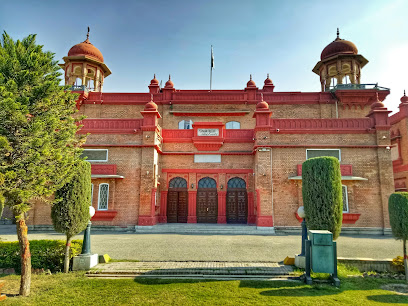
Chacha Younis Park
Experience the serene beauty of Chacha Younis Park in Peshawar, a perfect spot for relaxation and recreation amidst lush greenery.
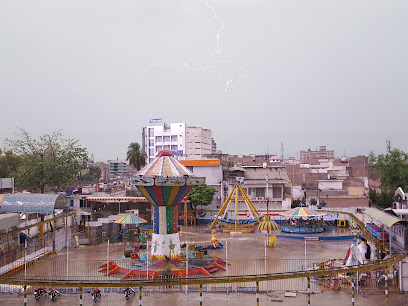
Wazir Bagh
Discover the serene beauty and rich history of Wazir Bagh, a historic park in the heart of Peshawar, perfect for relaxation and cultural exploration.
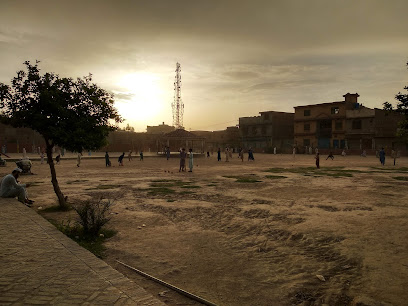
Zaiqa Rice, Zaiqa Chawal, Zaiqa Afghani Pulao
Discover the authentic taste of Peshawar at Zaiqa Rice, where traditional Afghani flavors come alive in a vibrant market setting.
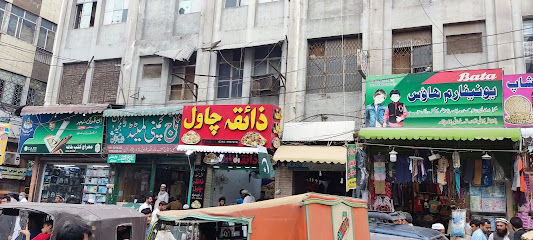
Sethi House Museum
Explore the architectural beauty and cultural heritage of the Sethi House Museum in Peshawar, a must-visit for history lovers and travelers alike.
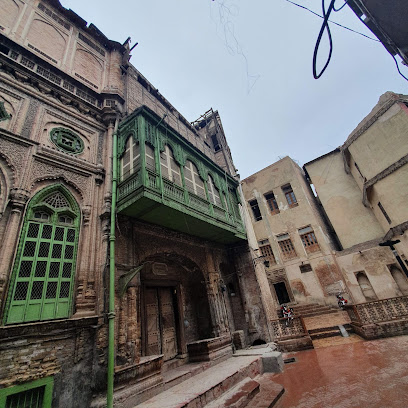
Asia Gate
Discover the cultural richness of Peshawar at Asia Gate, a historic site reflecting the city's vibrant heritage and architectural splendor.
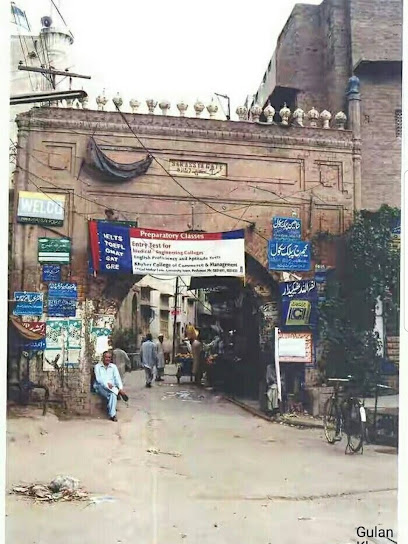
Tomb of Sardar Muhammad Ayub Khan (d. 1914)
Discover the Tomb of Sardar Muhammad Ayub Khan, a historical gem in Peshawar, where rich culture and heritage meet serene surroundings.
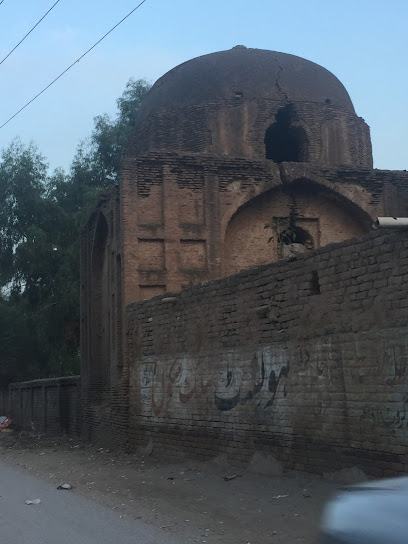
Kanishka Stupa Fort (200 CE)
Discover the ancient Kanishka Stupa Fort in Peshawar, a fascinating historical site rich in Buddhist heritage and architectural marvels.
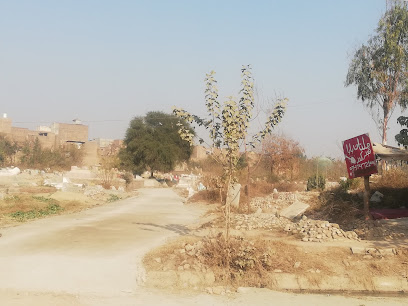
Qissa Khwani Bazar Gate
Explore the enchanting Qissa Khwani Bazar Gate in Peshawar, where rich history, vibrant culture, and local flavors come together in a quintessential marketplace experience.
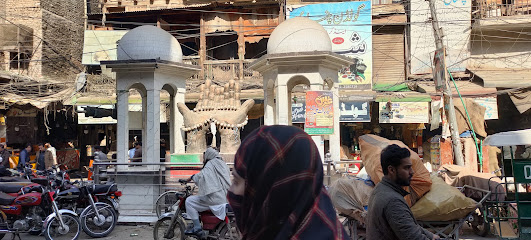
Lahori Gate Peshawar
Discover the historic charm of Lahori Gate in Peshawar, a gateway to the rich cultural heritage and vibrant life of the city.
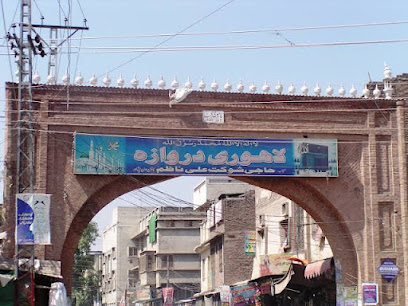
Tehsil Old Ruins
Explore the ancient remnants of Tehsil Old Ruins in Peshawar, a heritage site that reveals the rich history and culture of Khyber Pakhtunkhwa.
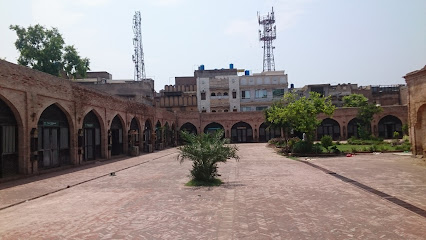
Unmissable attractions to see
Shahi Bagh
Discover the beauty and tranquility of Shahi Bagh, a historic park in Peshawar offering lush landscapes and rich cultural heritage.
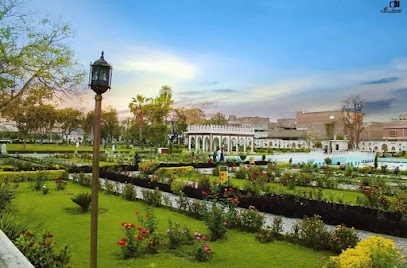
Jinnah Park
Explore the lush greenery and vibrant atmosphere of Jinnah Park, a serene escape in the heart of Peshawar, Khyber Pakhtunkhwa.
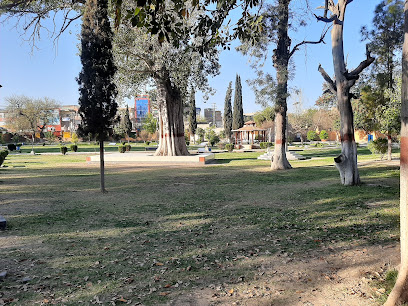
Mahabat Khan Mosque
Discover the breathtaking beauty and historical significance of Mahabat Khan Mosque, a Mughal architectural gem in the heart of Peshawar.
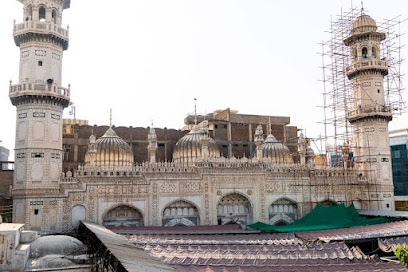
Peshawar Museum
Explore the cultural treasures and historical artifacts at Peshawar Museum, a must-visit destination for history enthusiasts and travelers.
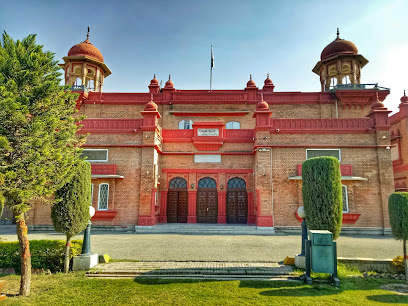
Chacha Younis Park
Discover serenity and recreation at Chacha Younis Park, Peshawar's cherished green haven ideal for families and nature lovers.
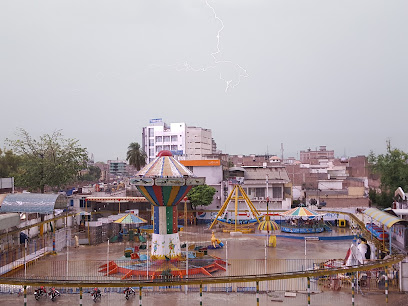
Khalid Bin Waleed Park
Discover tranquility and local culture at Khalid Bin Waleed Park, a lush urban retreat in the heart of Peshawar, perfect for relaxation and recreation.
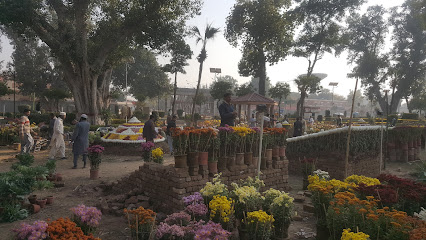
City Museum Karavan Serai
Discover the City Museum Karavan Serai: A Journey Through Peshawar's Archaeological Treasures and Cultural Heritage.
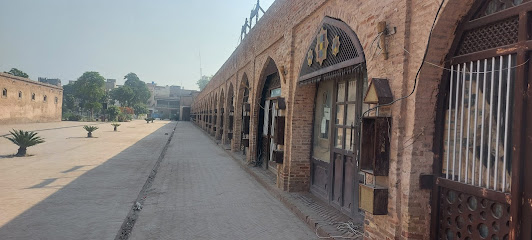
Shalimar Gardens Peshawar
Explore the enchanting Shalimar Gardens in Peshawar, a historical oasis of beauty and tranquility showcasing Mughal architecture and lush landscapes.
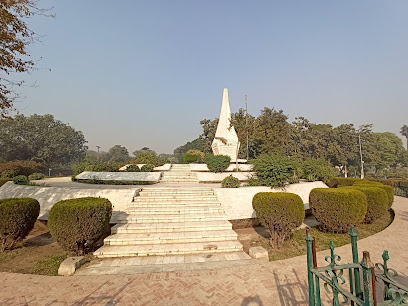
Essential places to dine
Nisar Charsi Tikka
Discover authentic Pakistani flavors at Nisar Charsi Tikka in Peshawar - home to irresistible grilled meats and vibrant dining culture.
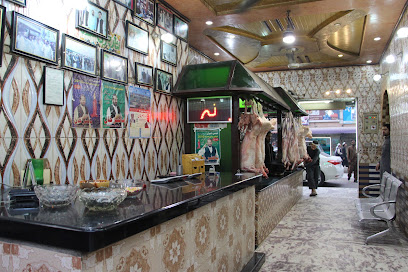
Shiraz Ronaq
Experience the vibrant flavors of Pakistan at Shiraz Ronaq, Peshawar's premier buffet restaurant offering diverse culinary delights.
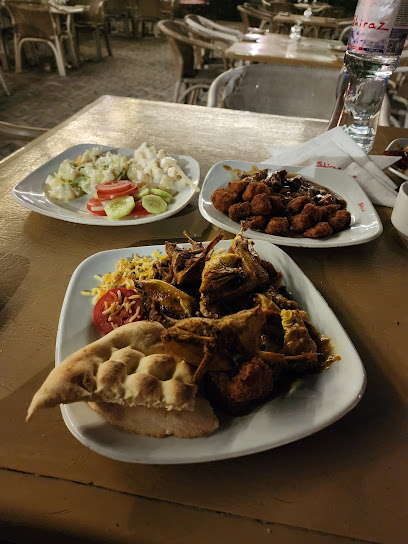
Habibi Restaurant Peshawar
Experience authentic Pakistani cuisine at Habibi Restaurant in Peshawar - where tradition meets flavor in every bite.
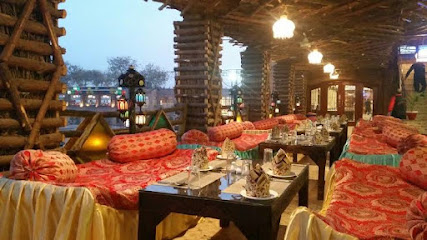
Laziz Chawal House
Discover authentic Pakistani cuisine at Laziz Chawal House in Peshawar – where every dish tells a story.
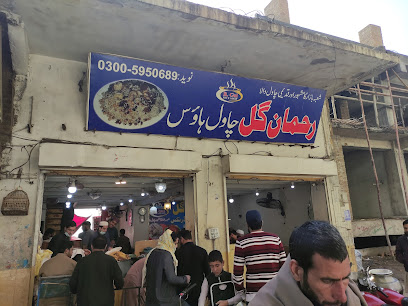
Namak Mandi Food Street
Explore the vibrant flavors of Pakistan at Namak Mandi Food Street in Peshawar—an unforgettable culinary adventure awaits!
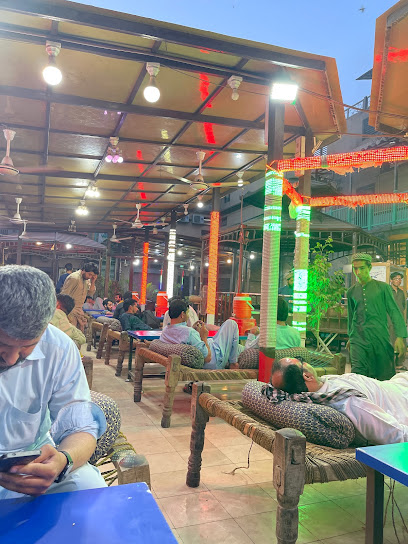
Zaiqa Rice, Zaiqa Chawal, Zaiqa Afghani Pulao
Experience authentic Afghani Pulao and traditional Pakistani rice dishes at Zaiqa Rice in the heart of Peshawar's historic Qissa Khwani Bazaar.
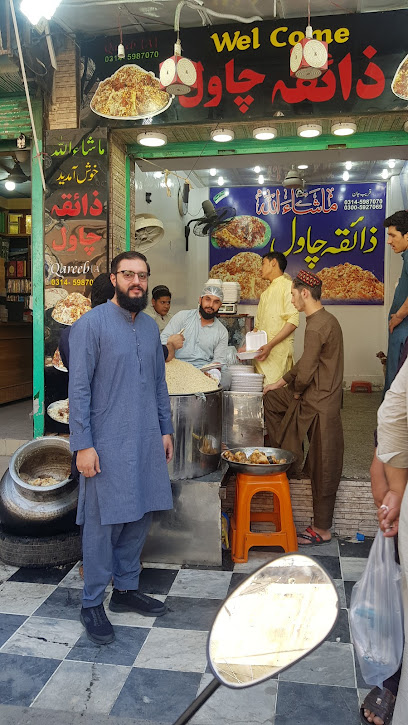
Namak Mandi Restaurant نمک منڈی
Experience the rich culinary heritage of Pakistan at Namak Mandi Restaurant in Peshawar, where every dish tells a story.
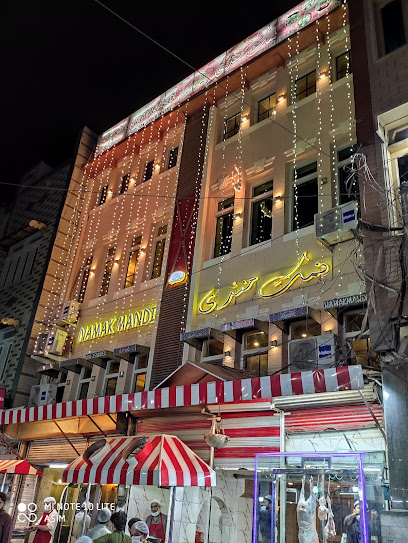
Nanna Mahi
Experience authentic Pakistani seafood at Nanna Mahi, a culinary landmark in Peshawar's historic Qissa Khwani Bazaar.
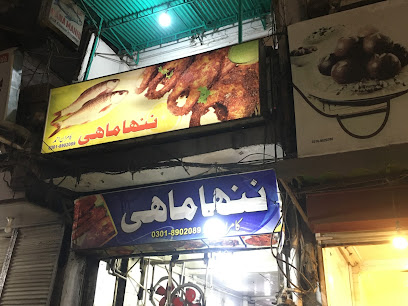
Ghanta Ghar Food Street
Discover Ghanta Ghar Food Street: A Culinary Delight in Peshawar's Vibrant Heart.
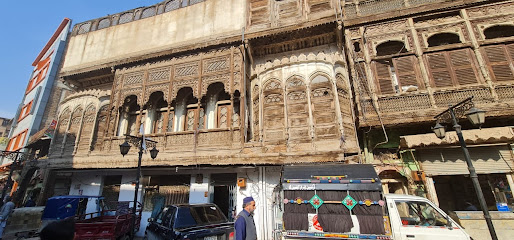
Qissa khuwani Cafe & shinwari
Experience authentic Pakistani flavors at Qissa Khuwani Cafe & Shinwari, where every meal is a celebration of tradition in Peshawar's vibrant atmosphere.
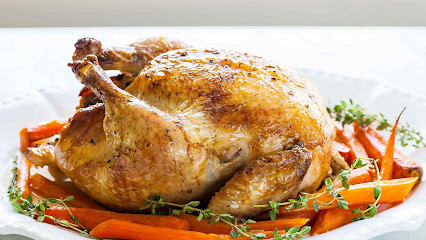
Markets, malls and hidden boutiques
Board Bazar Peshawar
Discover the heart of Peshawar at Board Bazar, a vibrant shopping mall filled with local crafts, delicious food, and an unforgettable atmosphere.
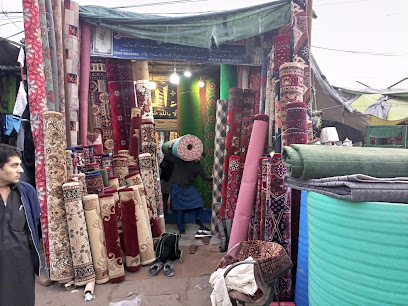
Lahori Sweet House
Experience the rich flavors of Pakistan at Lahori Sweet House in Peshawar's historic Qissa Khwani Bazaar, a paradise for sweet lovers.
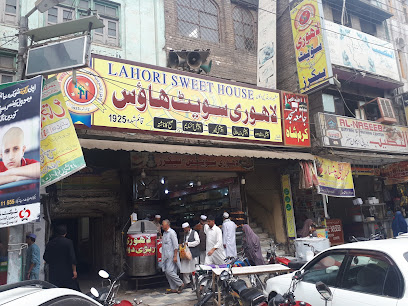
Expostore Peshawar
Discover the essence of Peshawar's fashion at Expostore, offering a unique selection of clothing at affordable prices.
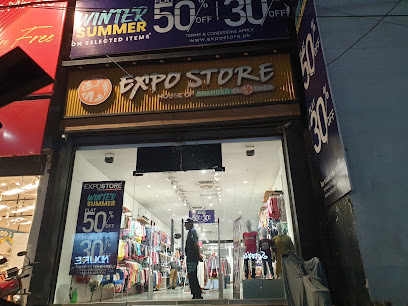
Qissa Khwani Bazar Gate
Explore the rich cultural tapestry of Peshawar at Qissa Khwani Bazar Gate, a bustling marketplace filled with unique crafts and delicious local cuisine.
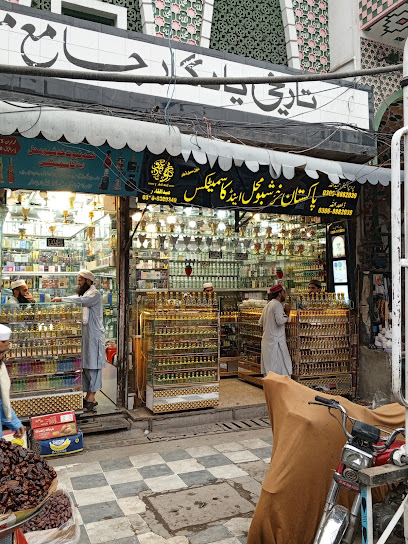
Babaji market
Discover the essence of Peshawar at Babaji Market, a bustling hub of shopping, food, and culture that offers unique local experiences and treasures.
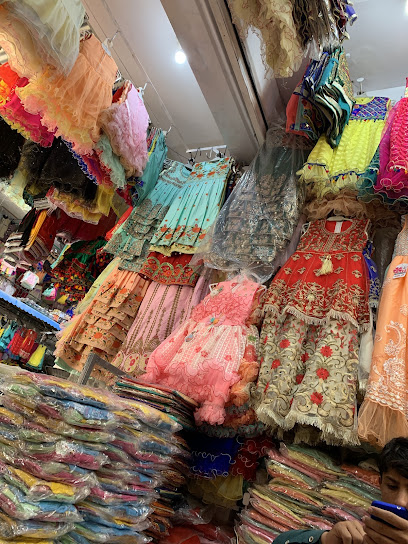
Nasir Book Center Book Shop Qisaa Khwani Bazaar Peshawar
Discover the literary heart of Peshawar at Nasir Book Center, a charming bookstore in the historic Qissa Khwani Bazaar, perfect for book lovers.
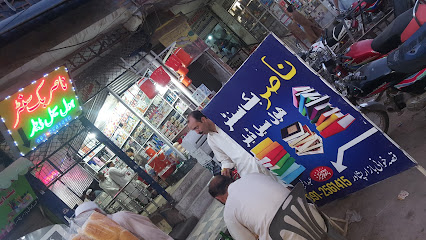
Unique Arts & Stationers
Explore Unique Arts & Stationers for a delightful selection of stationery and art supplies in the heart of Peshawar, perfect for creative minds.
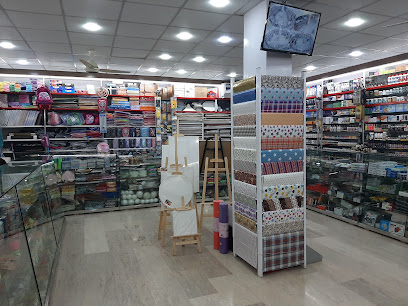
online bazar peshawar .
Explore the flavors of Peshawar at Online Bazar, where local produce and vibrant culture meet in a delightful grocery shopping experience.

Illusions peshawar
Discover unique handicrafts and souvenirs at Illusions Peshawar, the ultimate gift shop for cultural treasures and memorable gifts.

Unique Imported collection
Explore cutting-edge technology at Unique Imported Collection - Peshawar's premier electronics store with a diverse selection of imported gadgets.

Essential bars & hidden hideouts
Saeed Food Corner and fresh juice point
Experience authentic Asian cuisine and fresh juices at Saeed Food Corner in Peshawar, a vibrant hub for food lovers and cultural explorers.
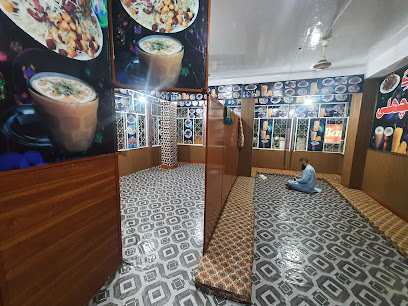
Qissa khuwani Cafe & shinwari
Discover the authentic taste of Peshawar at Qissa Khuwani Cafe & Shinwari, where traditional flavors and family-friendly vibes create an unforgettable dining experience.
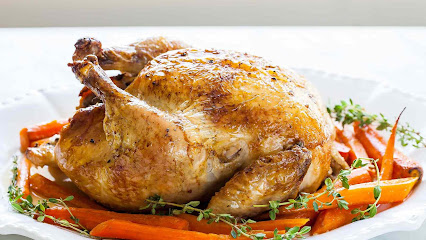
Itefaq street
Discover the vibrant nightlife at Itefaq Street, a popular bar in Peshawar offering a unique blend of local and international beverages.

Baba Lassi waala
Discover the taste of Peshawar at Baba Lassi waala, famous for its refreshing lassi and local delicacies in a vibrant atmosphere.
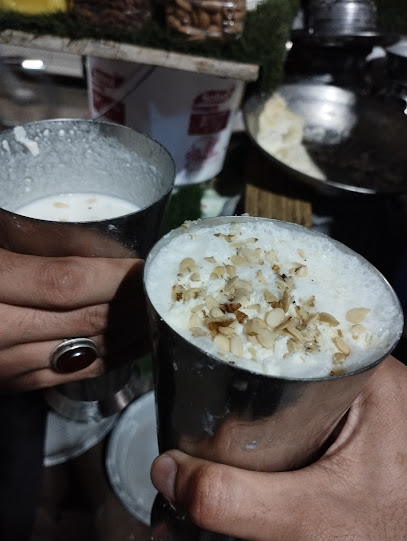
Ali Khan Juice Bar
Experience the vibrant flavors of Pakistan at Ali Khan Juice Bar, where every sip is a refreshing journey through local tastes.
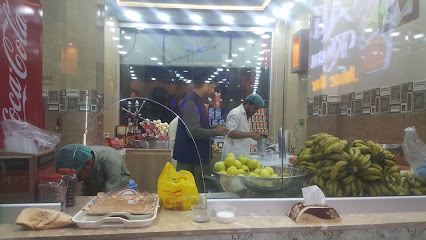
HAJI MEHBOOB COLD DRINKS
Discover the refreshing flavors of Peshawar at Haji Mehboob Cold Drinks, a local favorite for cold beverages and delightful experiences.
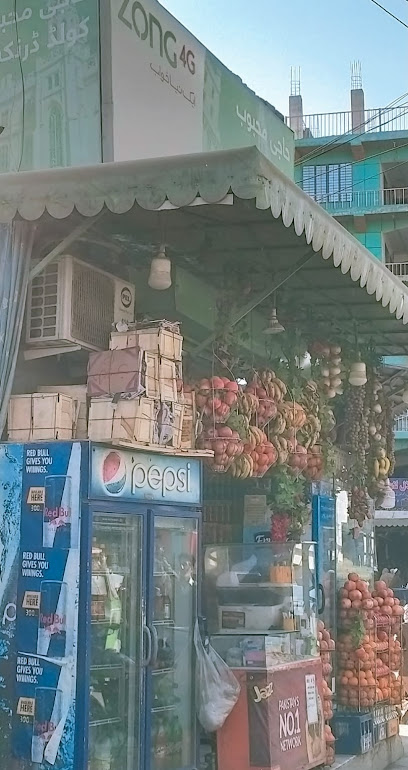
FIT AND FRESH
Discover the vibrant atmosphere and refreshing drinks at FIT AND FRESH in Peshawar's Bani Gala Gulbahar, a perfect retreat for travelers.

پشاور
Experience the vibrant nightlife of Peshawar, where tradition meets modernity in lively bars filled with culture and hospitality.

HARMAIN CABIN
Discover Harmain Cabin in Peshawar for a unique bar experience blending local charm with modern relaxation.
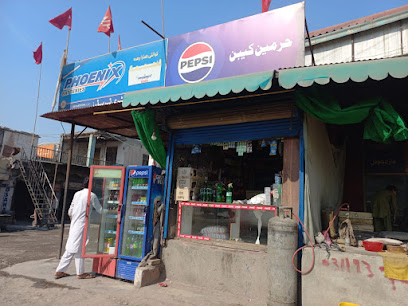
SAFI JUICE CENTER
Discover the vibrant flavors of Peshawar at Safi Juice Center, your go-to spot for fresh juices and local culture.
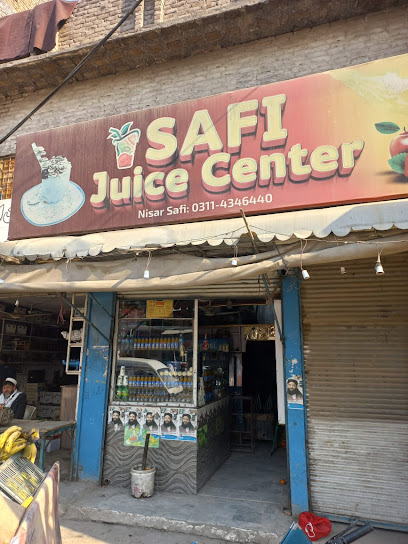
Local Phrases
-
- Helloسلام
[salaam] - Goodbyeخدا حافظ
[khuda hafiz] - Yesہاں
[haan] - Noنہیں
[nahin] - Please/You're welcomeمہربانی
[mehrbani] - Thank youشکریہ
[shukriya] - Excuse me/Sorryمعذرت
[maazrat] - How are you?آپ کیسے ہیں؟
[aap kaise hain?] - Fine. And you?ٹھیک ہوں۔ آپ؟
[theek hoon. aap?] - Do you speak English?کیا آپ انگریزی بولتے ہیں؟
[kya aap angrezi boltay hain?] - I don't understandمجھے سمجھ نہیں آیا
[mujhe samajh nahi aya]
- Helloسلام
-
- I'd like to see the menu, pleaseبراہ کرم مینو دکھائیں
[barah-e-karam menu dikhayen] - I don't eat meatمیں گوشت نہیں کھاتا
[mein gosht nahi khata] - Cheers!چیرز!
[cheers!] - I would like to pay, pleaseبراہ کرم بل دیں
[barah-e-karam bill dein]
- I'd like to see the menu, pleaseبراہ کرم مینو دکھائیں
-
- Help!مدد!
[madad!] - Go away!چلو!
[chalo!] - Call the Police!پولیس کو بلاؤ!
[police ko bulao!] - Call a doctor!ڈاکٹر کو بلاؤ!
[doctor ko bulao!] - I'm lostمیں گم ہو گیا ہوں
[mein gum ho gaya hoon] - I'm illمیں بیمار ہوں
[mein bemar hoon]
- Help!مدد!
-
- I'd like to buy...میں خریدنا چاہتا ہوں...
[mein khareedna chahta hoon...] - I'm just lookingمیں صرف دیکھ رہا ہوں
[mein sirf dekh raha hoon] - How much is it?یہ کتنے کا ہے؟
[ye kitnay ka hai?] - That's too expensiveیہ بہت مہنگا ہے
[ye bohat mehnga hai] - Can you lower the price?کیا آپ قیمت کم کرسکتے ہیں؟
[kya aap qeemat kam kar sakte hain?]
- I'd like to buy...میں خریدنا چاہتا ہوں...
-
- What time is it?کتنے بجے ہیں؟
[kitnay bajay hain?] - It's one o'clockایک بجے ہیں
[aik bajay hain] - Half past (10)دس بج کر پندرہ منٹ ہو چکے ہیں
[das baj kar pandrah minute ho chuke hain] - Morningصبح
[subah] - Afternoonدوپہر
[dopahar] - Eveningشام
[shaam] - Yesterdayگزرا ہوا کل
[guzra hua kal] - Todayآج
[aaj] - Tomorrowکل
[kal] - 1ایک
[aik] - 2دو
[do] - 3تین
[teen] - 4چار
[chaar] - 5پانچ
[paanch] - 6چھے
[chhe] - 7سات
[saat] - 8آٹھ
[aath] - 9نو
[no] - 10دس
[das]
- What time is it?کتنے بجے ہیں؟
-
- Where's a/the...?کہاں ہے...؟
[kahan hai...?] - What's the address?پتہ کیا ہے؟
[pata kya hai?] - Can you show me (on the map)?کیا آپ مجھے دکھا سکتے ہیں؟
[kya aap mujhe dikhla sakte hain?] - When's the next (bus)?اگلی بس کب ہے؟
[agli bus kab hai?] - A ticket (to ....)ایک ٹکٹ (سے ....)
[aik ticket (se ....)]
- Where's a/the...?کہاں ہے...؟
History of Qissa Khwani Bazaar
-
Qissa Khwani Bazaar, which translates to 'Storytellers' Market,' has been a cultural hub for centuries, known for its rich tradition of oral storytelling. Merchants and travelers would gather to share tales of their journeys, local folklore, and historical events, fostering a unique communal bond through storytelling.
-
Situated on the ancient Silk Road, Qissa Khwani Bazaar has historically been a vital trade route for merchants from Central Asia to the Indian subcontinent. This strategic location facilitated the exchange of goods, ideas, and cultures, making it a melting pot of diverse influences that shaped the region's history.
-
During the British colonial period, Qissa Khwani Bazaar underwent significant changes. The British established a presence in Peshawar, leading to the modernization of the bazaar with new infrastructure and the introduction of British goods. This period marked a transition in the bazaar's identity, as it adapted to new economic conditions while retaining its cultural essence.
-
One of the most notable events in the history of Qissa Khwani Bazaar occurred on April 23, 1930, when British troops opened fire on a peaceful protest against colonial rule. The massacre resulted in numerous casualties and sparked widespread outrage, becoming a pivotal moment in the Indian independence movement and a symbol of resistance for many in the region.
-
In recent years, Qissa Khwani Bazaar has experienced a revival of interest in its cultural heritage. Efforts to restore traditional crafts, promote local cuisine, and support artisanal industries have transformed the bazaar into a vibrant destination for both locals and tourists, celebrating its historical significance while embracing modernity.
Qissa Khwani Bazaar Essentials
-
Qissa Khwani Bazaar is centrally located in Peshawar, making it accessible from various neighborhoods. From the Peshawar International Airport, you can take a taxi or a ride-hailing service directly to the bazaar, which takes about 30 minutes depending on traffic. If you are coming from the main bus terminals, local buses and auto-rickshaws frequently service routes to the bazaar. The Peshawar Railway Station is about 15 minutes away by taxi.
-
Qissa Khwani Bazaar is best explored on foot due to its narrow lanes and vibrant street life. Walking allows you to soak in the local atmosphere and discover hidden gems. Local auto-rickshaws are available for short distances, while some visitors may opt to rent bicycles for a more leisurely exploration. Be cautious with traffic, as it can be chaotic.
-
Qissa Khwani Bazaar is generally safe for tourists, but like any urban area, it is wise to remain vigilant. Avoid walking alone late at night, particularly in less crowded areas. Pickpocketing can occur in busy markets, so keep your belongings secure. Areas around the bazaar are typically safe, but it's best to avoid the outskirts where crime rates may be higher.
-
In case of an emergency, dial 15 for police assistance or 1122 for medical emergencies. Hospitals and clinics are available within the city, but ensure you have travel insurance that covers medical costs. It's advisable to familiarize yourself with the location of the nearest medical facility while exploring the area.
-
Fashion: Do dress modestly to respect local customs. Women should consider wearing a scarf and long clothing. Religion: Do respect religious practices and sites. When entering mosques, remove your shoes and dress appropriately. Public Transport: Do be courteous and let others exit before boarding. Don't engage in loud conversations. Greetings: Do greet locals with 'As-salamu alaykum' and a handshake. Eating & Drinking: Do try local food, especially the famous chapli kebabs. Don't eat or drink in public during Ramadan, as it may offend local customs.
-
To experience Qissa Khwani Bazaar like a local, start your day with a traditional breakfast at a local eatery, sampling 'halwa puri.' Engage with shopkeepers and ask about their products, as many are eager to share their stories and the history behind their goods. Explore the nearby historical sites, such as the Peshawar Museum and the Mahabat Khan Mosque, which offer insight into the city’s rich heritage. Don't hesitate to try street food, but ensure it looks fresh and is from a busy vendor.
Trending Landmarks in Qissa Khwani Bazaar
-
Kohati Gate
-
Shahi Bagh
-
Sir Cunningham Clock Tower
-
Kabuli Gate Qissa Khwani Bazar
-
Peshawar Museum
-
Chacha Younis Park
-
Wazir Bagh
-
Zaiqa Rice, Zaiqa Chawal, Zaiqa Afghani Pulao
-
Sethi House Museum
-
Asia Gate
-
Tomb of Sardar Muhammad Ayub Khan (d. 1914)
-
Kanishka Stupa Fort (200 CE)
-
Qissa Khwani Bazar Gate
-
Lahori Gate Peshawar
-
Tehsil Old Ruins
Nearby Cities to Qissa Khwani Bazaar
-
Things To Do in Islamabad
-
Things To Do in Rawalpindi
-
Things To Do in Abbottabad
-
Things To Do in Swat
-
Things To Do in Murree
-
Things To Do in Chitral
-
Things To Do in Kaghan
-
Things To Do in Naran
-
Things To Do in Kabul
-
Things To Do in Gujranwala
-
Things To Do in Faisalabad
-
Things To Do in Sialkot
-
Things To Do in Gilgit
-
Things To Do in Jammu
-
Things To Do in Lahore







